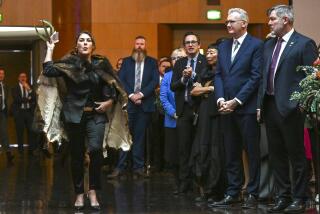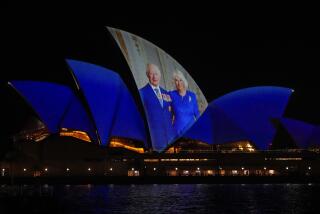Bush Stops in Australia to Reaffirm Friendship
- Share via
CANBERRA, Australia — President Bush delivered a personal “thank you” to Australia today, telling a joint session of the Australian Federal Parliament that “we value, more than ever, the unbroken friendship between the Australian and American peoples.”
But a vocal minority in the chamber were less enamored of the American president than he was with them. Bush’s remarks were disrupted several times by opposition members who denounced his policies in Iraq and objected to Bush’s description of Australia as a “sheriff” in Southeast Asia.
“We are not a sheriff,” shouted Sen. Bob Brown, leader of Australia’s Green Party, who was ordered to leave the chamber. He refused to budge and Senate officials let him stay. Brown and other Green Party members wore badges bearing pictures of two Australian citizens being held as unlawful combatants in Guantanamo Bay, Cuba. Some opposition Labor members also wore protest buttons and refused to applaud or stand in Bush’s honor.
Outside the parliament building, thousands of protesters chanted and waved signs reading “Bush is an Evil Guy,” and “War Criminal.”
Bush appeared unfazed, pausing in his remarks and gamely injecting after one interruption: “I love free speech.”
“Australians are fair-minded, and tolerant and easy-going. Yet in times of trouble and danger, Australians are the first to step forward, to accept hard duties, and to fight bravely until the fighting is done,” Bush said.
Before the president’s address, opposition leader Simon Crean told Bush that the Labor Party cherishes Australia’s alliance with the United States but also reveres the United Nations, which did not grant approval to the U.S. intervention in Iraq.
Crean pointedly noted that support for the U.S.-Australian alliance is based “not on American might, but on the democratic promise upon which America was brought forth.”
“Of course, on occasion, friends do disagree, as we did, on this side [of the aisle], with you on Iraq,” Crean said. “But such is the strength of our shared values, our interests, our principles, that those differences can enrich, rather than diminish. They can strengthen, rather than weaken the partnership.”
Labor Party members also presented petitions against U.S. policy in Iraq to national security advisor Condoleezza Rice.
For his part, Bush noted that Americans and Australians have served side by side in every major conflict since World War I, listing battles at Hamel, the Coral Sea, New Guinea, Korea and Vietnam.
“And in the war on terror, once again, we are at each other’s side,” Bush said.
He noted that the Sept. 11 attacks were followed by nightclub bombings in Bali on Oct. 12, 2002, in which 88 Australians died.
“We saw destruction and grief. And we saw our duty,” Bush continued. “As free nations in peril, we must fight this enemy with all our strength.” Australia is the last foreign stop on Bush’s weeklong trip to the region, a trip designed to bolster support for his efforts to combat terrorism and rebuild Iraq.
In an interview aboard Air Force One en route to Australia, Bush conferred one of his highest compliments on his Aussie allies: “Of all the people in the world who understand Texas, it’s probably Australians.”
Despite the long history of military alliance with the United States, Australia has indicated that it wants to curb such long-distance deployments and concentrate more on regional security. Australia withdrew its forces from Iraq earlier this year.
Bush created a stir last week when, in an interview with an Australian newspaper, he described Australia as Washington’s “sheriff” in Southeast Asia -- confirming fears of some Southeast Asian nations that Australia is a surrogate or “deputy sheriff” who enforces U.S. policy in the region.
“I was asked the question, ‘Is Australia America’s deputy sheriff?’ ” Bush told reporters today. “My answer was, no, we’re equal. We’re equal partners in the war on terror.”
Howard explained the term earlier as Texas vernacular.
“We don’t see ourselves as having any kind of enforcement role,” he explained. “But we’re always good to our allies, particularly the United States, to defend values that are important to both our societies.”
Many Australians believe Howard has tied the country too closely to Bush and Washington and worry that Australia may suffer a backlash from other countries in the region. Australia’s high-profile deployment of troops to East Timor, as well as its current leadership of a peacekeeping mission in the Solomon Islands, have contributed to that reputation.
From Australia, Bush flies to Hawaii, where he will visit the memorials in Pearl Harbor, meet with Pacific Island leaders and attend a Bush-Cheney 2004 fund-raiser before returning to Washington on Friday.
*
Times staff writer Richard C. Paddock contributed to this report from Jakarta, Indonesia.
*
(Begin Text of Infobox)
Military alliance
* Australia, New Zealand and the United States implemented the ANZUS security treaty in 1952. The pact originally committed the three nations to act together to combat an armed attack against any of them.
*
* The U.S.-Australia alliance remains in full force, but then-President Reagan dropped New Zealand from the military alliance in 1986 over the Wellington government’s opposition to visits by nuclear-armed warships.
*
* Canberra and Washington conduct a variety of joint activities, including military exercises and officer exchanges.
*
* In 2001, Australia activated the ANZUS pact after the Sept. 11 attacks on the World Trade Center and the Pentagon.
Los Angeles Times
More to Read
Get the L.A. Times Politics newsletter
Deeply reported insights into legislation, politics and policy from Sacramento, Washington and beyond. In your inbox twice per week.
You may occasionally receive promotional content from the Los Angeles Times.










